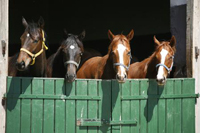October 2020
Holistic Horsekeeping
How to have a healthy happy horse.
Volume 25, Number 10
=*=*=*=*=*=*=*=*=*=*=*=*=*=*=*=*
In This Issue:
1. Stress Induced Ulcers in Horses: Is Your Horse Stressing Out?
2. Holistic Horsekeeping Resources
=*=*=*=*=*=*=*=*=*=*=*=*=*=*=*=*
1. Stress Induced Ulcers in Horses: Is Your Horse Stressing Out?

It is easy to recognize stress in the horse that walks his stall, cribs or kicks the walls. This type horse is telling you loud and clear that he is not happy and chances are he also has an ulcer. But what about the horse that loves his job, likes his person and surroundings – is this horse also a candidate for ulcers? The truth is ulcers in horses don’t just happen to those that are unhappy with their lives. Ulcers can happen to any horse under stress, even yours.
Stress in Horses
So what is stress to a horse. Confinement, infrequent feedings, separation from other horses, and trailering are a few known stressors for horses. Other causes of stress could be an increase in difficulty of a training exercise, a change in training routine, a change in surroundings or change in horses he is stabled with. These are just a few types of stress a horse might experience. The list of possibilities is endless.
Examples of stress in horses:
- Confinement
- Infrequent feeding
- Separation from other horses
- Trailering
- Change in training difficulty, training routine, surroundings, horse companions
Not every horse shows stress outwardly. Unfortunately, the horse that suppresses his emotions may seem perfectly fine but still get ulcers. Stall weaving, cribbing, kicking the walls of a stall or trailer are all signs that a horse is stressed but so are generalized muscle tightness, decreased appetite and a depressed attitude. Any of these signs could be warnings of current or developing ulcers in horses.
Signs of stress in horses:
- Stall weaving
- Cribbing
- Kicking the stall or trailer
- Generalized muscle tightness
- Decreased appetite
- A depressed attitude
Effects of Stress on the Body
Stress is not some imaginary emotion that can be controlled with will power. When the body perceives stress, real or imagined, it secretes hormones that have profound effects on many systems, including digestion. Any acute stressful event will cause digestion to cease as the body prepares to fight or escape. Blood flow is diverted away from the digestive tract to the heart and muscles, secretion of saliva and digestive enzymes is slowed, intestinal motility slows and nutrient absorption stops. The body under acute stress also slows the production of protective mucus that lines the stomach wall and bicarbonate that buffers the stomach acid.
If stress happened infrequently the horse could relax after a stress and digestion would return to normal. The problem comes when acute bouts of stress come repeatedly or low level stress persists on a constant level. In this case the horse continues to eat but proper digestion does not occur. This can cause gas or impaction type pain or ulcers in horses that are not producing enough protective mucus or buffering bicarbonate.
Physiological effects of stress in horses:
- Blood flow diverted away from the digestive system to the heart and muscles
- Decreased secretion of saliva and digestive enzymes
- Decreased intestinal motility
- Decreased absorption of nutrients
- Decrease in production of protective mucus and buffering bicarbonate
How to Reduce Stress in Horses
The bottom line is we want our horses to be stress free but this is almost impossible to achieve in real life. What we can do is take steps to prevent the development of ulcers in horses that are experiencing the basic stresses that are part of being in training. We can make sure the horse gets adequate turnout or work to match his energy level. We can feed smaller, more frequent, easily digested meals with more hay and less starch and sugar high concentrates. We can make sure horses get contact with other horses and provide them with a routine and good management.
We can and should plan to support the horse’s digestive tract with nutrient dense, whole food supplements, pre and probiotics, digestive enzymes, soothing herbs and products that contain nitric oxide precursors to help with blood circulation to the digestive tract. Different type and temperament horses respond differently to stress and will need different digestive support for best results. Check out the Horse Harmony book to help you determine your horse’s temperament type and look at our Feeding Guide to help select the best digestive support.
[Source: The Cortisol Connection]
2. Holistic Horsekeeping Resources

To learn more about caring holistically for your horse, get the Holistic Horsekeeping book from Madalyn Ward, DVM. It is available on her website in paperback, or on Kindle in digital or paperback formats. You’ll also find online courses, ebooks, audios, DVD’s , books and Kindle books at https://holistichorsekeeping.com/education.html; or the horse temperament typing online class at https://horsetemperament.com/class.html. We also offer a library of articles, a blog full of information, a mentoring program, consults with Dr. Ward, and a variety of equine products Dr. Ward recommends and uses herself. From education to natural supplements, we have it all at www.holistichorsekeeping.com.
++++ Copyright | Getting On and Off the List ++++
Unless otherwise attributed, all material is written and edited by Madalyn Ward, DVM. Copyright (c) 2020 HolisticHorsekeeping.com and Madalyn Ward, DVM. All rights reserved.
If you like the material in this newsletter please let your friends know about it. You may reprint material in other electronic or print publications provided the above copyright notice and a link to http://www.holistichorsekeeping.com is included in the credits.
You can get off this list by sending an email to info@holistichorsekeeping.com.
When you forward this material, please send the entire newsletter. Thanks!
Please also enjoy all of Dr. Ward’s web resources:
http://www.holistichorsekeeping.com
http://www.horsetemperament.com
http://blog.horseharmony.com
https://www.facebook.com/HolisticHorsekeeping
https://www.facebook.com/HorseHarmony
Twitter: madalynward